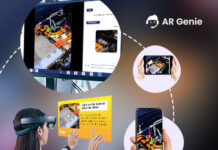
Virtual reality (VR) often makes the headlines as a game changer in technology, but is actually a niche brand of technology with very limited applications for the wider business community, says GlobalData, a leading data and analytics company.
Josh Hewer, Technology Analyst at GlobalData commented: “VR is the total emersion within a virtual space that can often be sold as a form of escapism. However, the future will not be about escaping reality, but rather augmenting the existing space within the digital world.
“Unlike VR, augmented reality (AR) does not retreat into a purely digitally-created world – instead it overlaps the real world with data and images visible through actual human sight.”
The technology’s role outside of consumer devices will encompass more dynamic tasks such as proof of concepts for architects, and enhanced awareness for drone operators. Another example would be the potential to offer operational teams visual displays of unit history – rather than storing massive amounts of paperwork on computers.
Hewer continues: “AR could be the game changer for businesses. It is impossible to sell a digital space completely removed from reality of the workplace. AR has a tangible benefit versus the more abstract concept of VR, offering companies a more pragmatic digital solution.”
The markets have reflected the success of fusing traditional operations with smart capabilities, also known as the internet of things (IoT). GlobalData’s annual survey of over 1,000 IoT project managers showed that 80% of these deployments are bought exclusively by technology-focused consumers or IT specialists.
Hewer concludes: “In 2016 Pokémon Go dominated headlines in specialist and mainstream press. Downloaded over 650 million times, it is the poster child of AR. It will be the companies able to replicate Pokemon’s success that will succeed in the race to combine the virtual world with the one we are used to.”


















